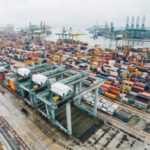President Trump announced on 1 March that he would impose tariffs respectively of 25% and 10% on US imports of steel and aluminium. The backdrop to this dramatic action is of course the longstanding decline in US steel production, together with the sustained impact on world steel markets of Chinese overcapacity in the sector. The […]
Read moreCommentary








